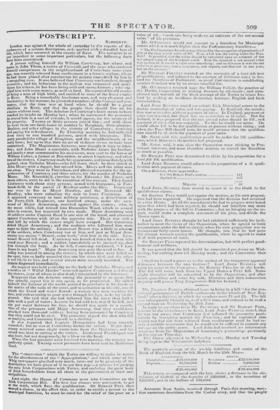The "concession" which the Tories are willing to make in
return for the abandonment of the " Appropriation," and which sonic of the Whig newspapers glorified very much, turns out to be precisely of the description we have given of it in our first page—a scheme for packing the new Irish Corporations with 'f ories, and excluding the great body of Irish householders from all share in the government of their mu- Last night, the House of Commons went into Committee on the Irish Corporation Bill. The first live clauses were postponed, to get at the sixth, which fixes the qualification. Sir Romer PEEL then moved a clause, to the effect that, in order to entitle IS person to the Municipal franchise, he must be rated fur the relief of the pour on a
value of 101., "such rate being made on an estimate of the net anneal value" of his premises.
Mr. O'CoNisELL would not consent to a franchise for Municipal voters which was much higher then the Parliamentary franchise— 'flue Pal !lament:it v franchise was ehteined hy the occupation of premises hisiel fide of the clear yearly. value of 101. Now, whit was the rating under the Poor Bill? It providesl that the vslne should he calculated upon an estimate of the net annual value of the tenement rated. Now the moment a net annual value was spoken of, it meant a value over something; and in this case it was the net value (wet puet-rdte■, taxes, iLsurdneds, and repairs, and that not in one year, but on the average."
Sir WILLreet FOLLETT insisted on the necessity of a bond fide test of quelification; and referred to the creation of fictitious, votes in Ire- land for Menders a Parliament, as proof that caution in establishing another franchise was by no means uncalled for.
Mr. O'CONNELL retorted upon Sir William Follett, the practice of the Dublin Corporation in making freemen by wholesale; and com- plained with warmth of the fresh attempt of the Tories to injure Ire- land hy making un invidious distinction between English and Irish householders.
Lord JOIIN RUSsELL Woll!od not submit Irish Municipal voters to the double restriction of value and rate-paying. In Scotland, the restric- tion was us to value without payment of rece. In England, payment of
rates was required, but there was 110 reetliction as to value. But for Ireland, it was proposed that the net atmual value should be 101., and payment of noes also was required. To thie be would not agree. He would allow 111/ to be the qualification at present without rating ; and when the Pour Bill should pass, he would propose that tbe qualifiestion should be 5/. with the payment of poor-rates.
Mr. SilAW said, this valification would he under the 10/. qualifica- tion, which Ministers themselves had proposed.
Mr. SilEI I. Said, it was clear the Opposition were sticking to Pro- testant intereste, and were therefore anxious to curtail the franchise as much as possible.
Sir Romer PrEr. was determined to abide by his proposition for a bond fide 101. qualification.
Lord Joints RUSSELL would adhere to his proposition of a 5/. quali- fication with payment of rates.
On a division, there appeared—
For S:ir Robert Peers !notion III Agaiust it 107 Majority • 20
Lord JOHN RUSSELL then moved to insert 5/. in the blank in the qualification clanee.
Sir Romer PEI' t. would not oppose the motion, as his own proposi-
tion had been negatived. He regretted that the division had occurred in a thin House. As all the amendments he had to propose were based upon that which bud been rejected, he should riot interfere any more with the progress of the bill in Committee ; but on bringing up the re- port, would make a complete statement of his plan, and divide the House upon it.
Lord JOIIN RUSSELL thought Ile had exhibited sufficiently his incli-
nation to meet the views of the Opposition, when he agreed to limit corporations under the bill to eleven, when his own proposition was to incorporate forty-seven towns. He thought, too, that be had gone far enough towards raising the qualification, schen be agreed to make it 5/. with payment of rates.
Sir Romer PreLrepeated his determination, but with perfect good- humour and mildness.
It was agreed that the bill should be committed pro fitrma On Wed- nesday, but nothing done till Monday week ; and the Committee then ro-e.
ehall we bezard n guess as to the upshot of the temporary apparent ditlerenee between the two factions Lord JOI1N RUSsELL will cat ry his point ill the Coin lie ; Sir Ronsete PEEL his in the Lords. The bill will come back front the Upper House a PEEL bill. Some slight alteration will be submitted to by the Opposition ; and after much grumblims and some big talk, Ministers and their subservient majority will pass a Toly Corporation Bill for Ireland.]


























 Previous page
Previous page